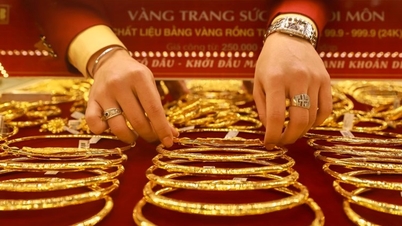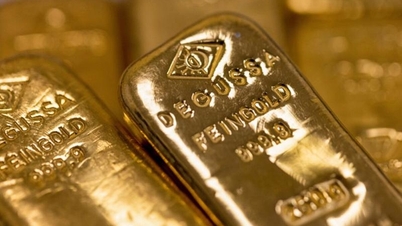Despite gold prices setting new records, data shows that China is the world's largest consumer of gold.
According to Kitco, the China Gold Association (CGA) announced that the country's gold consumption in the first quarter of this year was 5.94% higher than the same period in 2023, due to the increasing demand for gold as a safe haven asset among people.
Specifically, China bought 308.91 tons of metal in the first quarter. CGA said gold bars and coins accounted for 34% of total gold volume, increasing 26.77% to 106.32 tons in the last quarter.
Gold prices hit an all-time high, making the precious metal attractive to investors, but a major hindrance to consumers. Figures show that gold jewelry sales fell 3% in the quarter to 183.92 tonnes. The CGA said the rising gold prices have also hit gold processing and trading companies.

Imported raw gold output increased by 78% to 53.23 tons, bringing total domestic gold output to 139.18 tons, 21.16% higher than the first quarter of last year.
According to the Hong Kong Census and Statistics Department (China), China's net gold imports through Hong Kong in March increased by 40% compared to the previous month.
The world's top gold consumer imported a net 55,836 tonnes of the precious metal in March, compared with 39,826 tonnes in February, data showed. Total gold imports from Hong Kong rose 40.2% to 63,499 tonnes.
A recent report by the World Gold Council (WGC) said that China has added gold to its reserves for 17 consecutive months. The amount of gold held by the People's Bank of China (PBOC) at the end of March reached 72.74 million ounces (2,263 tons), up from 72.58 million ounces (2,257 tons) in February. The value of gold reserves increased from $48.64 billion to $61.07 billion.
The PBOC will also be the region’s largest official gold buyer in 2023, with 224.9 tonnes. The People’s Bank of China currently holds an estimated 2,257 tonnes of gold in its vaults.
Gold trading volume on Chinese exchanges is at a five-year high. However, experts predict that China's gold demand will remain high.
China relies heavily on the US dollar for global trade, analysts say. Over the years, China has accumulated significant foreign exchange reserves, mostly in US dollars. Beijing is concerned about its heavy reliance on the US dollar and aims to diversify the PBC’s reserves. China is gradually reducing its holdings, down to about US$800 billion, according to US data.
In China, gold remains an important asset, alongside stocks and real estate. But the severe downturn in the real estate market and the decline in Chinese stocks have made gold more attractive.
According to Philip Klapwijk, CEO of Precious Metals Insights, the volatile stock market as well as the weak yuan, all these factors make Chinese money flow more to gold because of the high safety of precious metals.
Source




![[Photo] Readers line up to visit the photo exhibition and receive a special publication commemorating the 135th birthday of President Ho Chi Minh at Nhan Dan Newspaper](https://vphoto.vietnam.vn/thumb/1200x675/vietnam/resource/IMAGE/2025/5/17/85b3197fc6bd43e6a9ee4db15101005b)
![[Photo] Nearly 3,000 students moved by stories about soldiers](https://vphoto.vietnam.vn/thumb/1200x675/vietnam/resource/IMAGE/2025/5/17/21da57c8241e42438b423eaa37215e0e)












![[Infographic] Numbers about the 2025 High School Graduation Exam in Dong Thap Province](https://vphoto.vietnam.vn/thumb/402x226/vietnam/resource/IMAGE/2025/5/17/c6e481df97c94ff28d740cc2f26ebbdc)



















































































Comment (0)